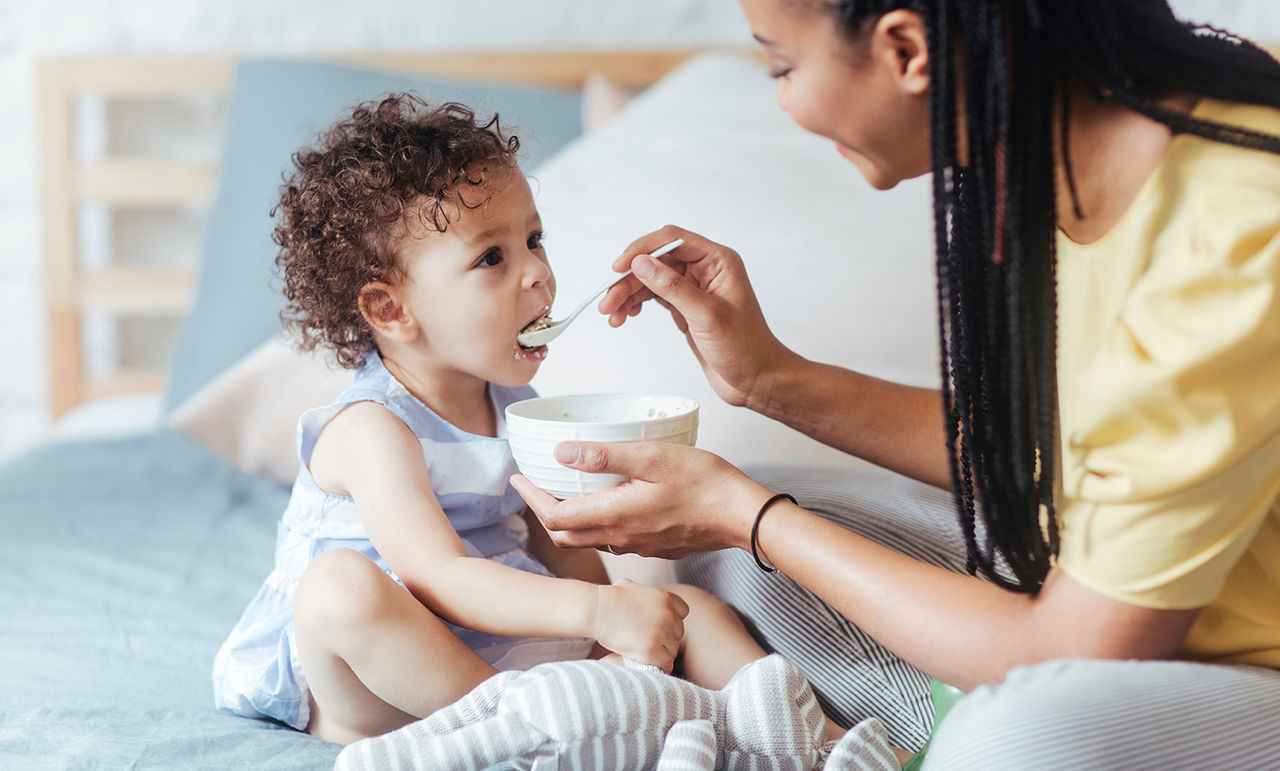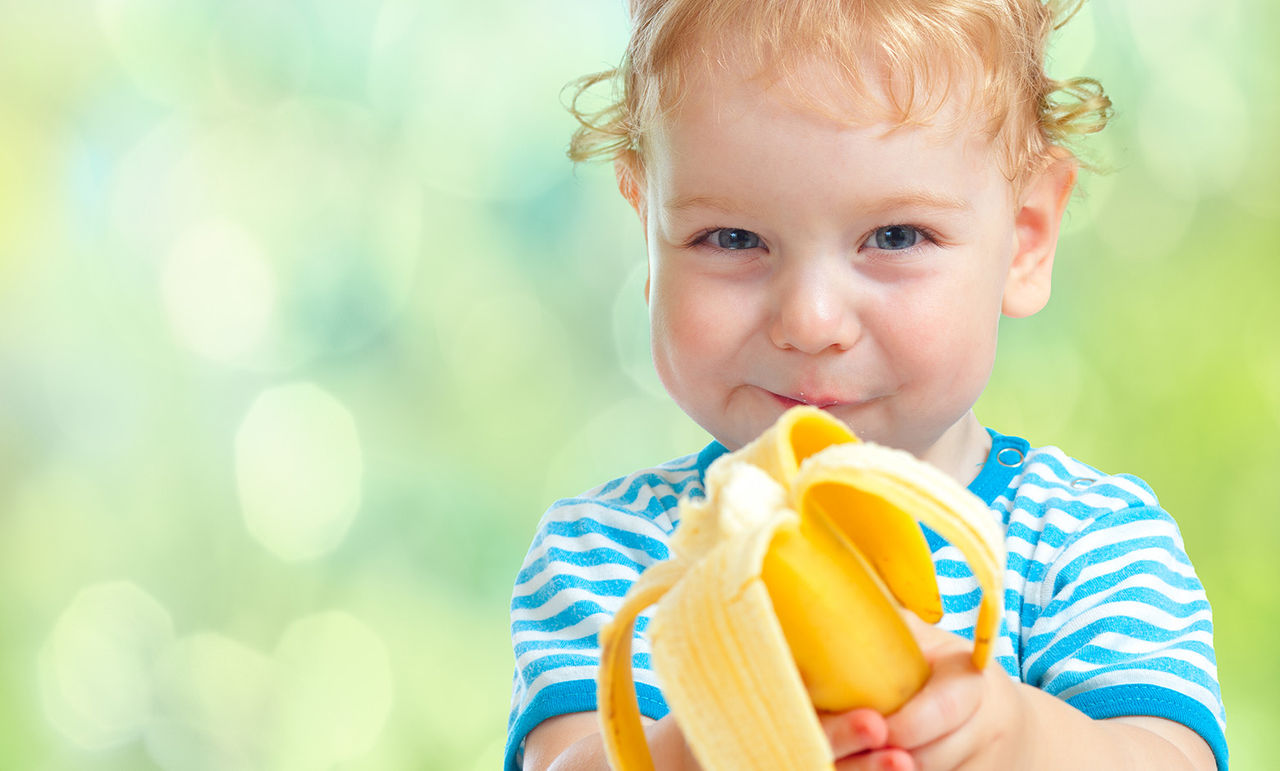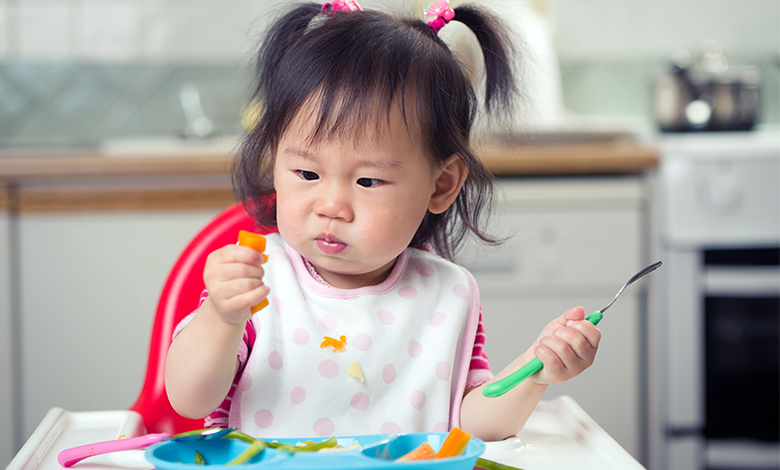- Your baby is slowly moving beyond just vocalising funny sounds, they can recognise basic words.
- Separation anxiety may still be prominent.
- Your little one is going to love cuddling with family and close friends.
- Sitting and standing may be mastered at this stage!
Your Baby's 9 Month Developmental Milestones

Key points
At 9 months of age, your baby is mobile and excited to explore the world. Many babies by this stage can crawl and lift themselves to a standing position, so baby-proofing the home has become more important than ever. You may have also noticed how chatty they have recently become, an exciting indication that they are gearing up to speak in the near future.
There are plenty of developmental milestones to look forward to for a 9 month old and this article will guide you through each one. You are sure to be a master of peek-a-boo and understanding your baby's babbling by the time you finish reading our helpful tips and in-depth milestone information!
It is common for 9 month old babies to experience a growth spurt of the body and brain, which means more food is required to fuel your baby's growth. Nutrition is crucial at this age, so be sure to provide variety in their diet from all 5 major food groups:
● Grains and cereal.
● Vegetables.
● Fruit.
● Meat and meat alternatives.
● Dairy and dairy alternatives.
These solid foods are best offered in the form of finger foods to develop your baby's fine motor skills. This also allows them to practise self-feeding, which can boost their confidence and sense of independence. Having access to a range of foods can also support your baby's immune system.
From 9 months, food provides more nutrition needed for the growth and development of your baby.
You can be sure that your baby is getting enough nutrition from both breast milk and solid foods through the following signs:
● Plenty of wet nappies each day.
● Weight gain at a suitable rate for their age.
● Alertness and happiness after and between feeds.
Breastfeeding
Although 9 months of age indicates the beginning of a slow tip towards relying more on solid food over breast milk, the latter is still integral for your baby's development.
While babies at this age can generally eat solids before breast milk, make sure every meal features both, for nutritional balance.
If you are not sure whether your baby is at the appropriate weight for their age, or is not getting enough nutrients, contact your doctor, nurse or paediatrician. They can help you create a meal plan for your baby to gain more weight and meet their necessary growth spurt.
For many babies at this age, you may have noticed that they seem restless at night and reluctant to fall asleep. While this may seem like another bout of sleep regression, it may be due to other causes such as the development of teeth or separation anxiety.
Your baby's development has led them to recognise you as their primary caregiver, which has resulted in them becoming incredibly attached. This can lead to an increased sense of anxiety when you leave, even if it is for a moment.
While most babies have their own response to this anxiety, common signs that your baby is feeling distressed by your leaving are:
● Shyness.
● Crying.
● Fussiness.
● Refusing to be comforted by another.
● Clinging to you.
● Difficulty sleeping.
At night, babies feel anxious when you leave them alone in their cot. This may result in them refusing to go to sleep. Fortunately, this stage of separation anxiety is typically temporary and can be alleviated by:
● Giving them a stuffed animal or toy your baby loves.
● Always saying goodbye, but keeping it brief to prevent working them up.
● Setting a routine for bedtime.
● Waiting until your baby is nearly asleep before quietly leaving them.
For 9 month milestones, your child's development will be focused on expanding upon existing skills. For example, they will be working hard at standing, as well as learning more about how to play games suitable for their age. There is a lot to look forward to and celebrate!
Physical
Physical development at 9 months of age has most babies practising their standing and stability during movements. This includes the act of getting into a sitting position or crawling, which most babies may be able to do unassisted. Most may also lean forward from sitting and stand upright without falling over.
Your baby may also be practising how to carefully sit down after standing upright. While they usually needed your assistance or simply slowly fell down, babies at this age can bend their knees to come to sitting. They may still struggle with this skill, however, so be sure to keep an eye on them.
Cognitive
At nine months, your baby loves to play games with you. This helps their cognitive development and allows them to understand how their world works.
Back-and-forth play is one of the best ways to practise skills at this age, wherein your baby initiates and you respond positively. This may be done through physical actions or verbal, such as:
● Passing games, where a toy is handed to you and then taken back.
● Stacking objects.
● Playing with moving parts and waiting for a response.
● Putting objects into a container and removing them.
● Babbling to you and making 'conversation'.
Your baby is happiest when you engage in play along with them. This personal time indicates you are interested in them and value their words and actions.
Emotional
As their primary caregiver, your baby is most comfortable around you and will not hesitate to show it. Beyond separation anxiety, your baby will also 'check-in' with you regularly during playtime for approval. They will also make more complex facial expressions to show their broadened range of emotions.
Communication
Communication development sees significant growth at this age with many parents noticing their baby understanding the meaning of words. This includes more than recognising their name by now. They can now also identify objects when you mention their name. They will also look at something if you point, and maybe even point their index finger at it as well.
Babies will also get your attention by making noises, copying sounds, or babbling. However, they may also stop if you say 'no’.
Social
Your baby may be experiencing separation anxiety during this age, but they may still enjoy meeting new people. While initial shyness is to be expected, some babies love to interact with strangers and especially love to interact with their families. Lots of cuddles and expressions of love are to be expected around this time.
Milestones to monitor
Your baby's development is unique and unlike any other, so do not worry if they are not following this timeline of skills exactly. However, you may want to contact your doctor, child health or Well Child nurse or a healthcare professional if they:
● Cannot be comforted by or do not recognise you or any other caregivers.
● Do not turn towards quiet sounds.
● Have yet to start moving.
● Hold their body stiffly instead of sitting.
● Are not babbling or making recognisable sounds.
● Are not showing interest in or reaching for objects.
At this age, your baby is fascinated with 'making things happen'. Playtime is the best moment to explore their environment and look for reactions. This curiosity should be encouraged through various activities that engage your baby and have them understand the effect they have on the world, such as:
● Playing peek-a-boo with your hands or behind an object. Make sure to say their name as you do it so they learn to associate it with them.
● Playing with their feet when lying on their back.
● Talk with them while making eye contact.
● Making sounds when you bring your face to their tummy and give them tickles.
● 'Grabbing' their nose or yours, identifying who it belongs to.
● Repeatedly dropping toys from their high chair or change table and having you bring them back.
● Lying on their tummy and grabbing for objects within their reach.
Socially, your baby may also enjoy doing these activities with other loved ones like family and close friends. This allows them to practise their developing skills while making new connections and socialising.
On the move
Since your little one is starting to move around under their own power, a baby-proof house is crucial. Their curiosity can lead them to grab objects that are not safe or put choking hazards in their mouth. Removing the possibility of interacting with these hazards is one of the best ways to keep your baby safe and healthy.
Although the whole building and each room can be made safe in their own way, some general precautions to protect your baby while they are on the move are:
● Fixing or removing any broken furniture.
● Checking smoke alarms are installed and have batteries in them.
● All low cupboards and drawers have slide locks or latches to keep them closed.
● Move all hazardous chemicals, kitchen utensils and cleaning products to locked spaces or out of reach from children.
● Move tripping hazards like extension cords out of spaces your baby moves about it.
● Ensure all small objects and choking hazards are not within reach of your baby.
● Secure furniture to the floor or walls with anchors to prevent them from wobbling or falling over when grabbed.
● Add corner cushions to low furniture with sharp edges.
● Place non-slip mats under rugs.
● Ensure all indoor plants are not harmful or toxic.
● Remove glass furniture from spaces your baby will be in.
● Cover exposed powerpoints with safety plugs.
● Install finger-pinch guards on walls.
● Add adjustable gates to hallways and/or stairs.
Baby-proofing looks different for each baby and environment, so find what works best for you and your little one. However, always remain on the lookout for more potential hazards to secure your baby's safety while on the move.
Unless you are catching up on previously missed vaccinations, there are no scheduled immunisations or doctor check-ups for a 9 month old baby. However, if you are ever concerned about your baby's growth or wellbeing, it is best to get in contact with their doctor as soon as possible.
Otherwise, those who are bottle feeding at this age may want to consider stopping sterilising the bottles and feeding equipment. It is still important to ensure things are cleaned thoroughly. Bottles should still be washed well in hot soapy water and rinsed, but your baby's immune system can now handle more germs. In fact, it is good to expose them to a small number of germs to build resilience, so long as it is balanced with good nutrition.
Self-care tips for parents
By this stage, you may feel like an expert when it comes to balancing childcare and self-care. However, some extra tips to consider for parents of a 9 month old include:
● Exercise daily to improve your physical health and boost your happy chemicals.
● Treat yourself for being such a great parent and working hard; whether that is through new clothes or a nice meal out.
● Take the time to socialise regularly with family and friends.
● Get as much sleep as possible to ensure you are well-rested.
● Reach out to support groups if you are feeling overwhelmed or isolated. There are other parents out there who understand what you are going through and can give you advice and/or empathy.
With every passing month, you are coming closer to your baby's first birthday. It feels like they are growing up so fast and developing new skills with every passing moment. Between taking care of yourself and your little one, find the time to celebrate each milestone and appreciate the little moments of joy.
We’re here to help
Our team of nutritionists, dietitians and midwives at Careline are healthcare professionals with big hearts. Specialising in infant and child health, they offer parents and carers, free nutrition, feeding and product advice and lots of moral support. Contact our Careline Experts by phone, LiveChat or email.
Always consult your doctor, midwife or healthcare professional for advice about feeding your baby.
Every feeding journey is unique
Not every parent can breastfeed. Not every parent can produce breast milk. No matter what choice you make, we will support your unique feeding journey.
We at Nutricia believe in providing the best nutrition for babies, which is why we recognise breast milk as uniquely superior for babies, it provides many benefits. It is important that mums have a healthy diet to support breastfeeding. A decision not to breastfeed, or partial bottle feed, may reduce breast milk supply making it difficult to reverse. The cost and social implications of using feeding methods should be considered. Always seek professional for advice about feeding your baby. Ensure formula is used as directed as improper use can affect baby’s health.
Please note: These articles are meant to give you a general sense of the growth and development of your newborn baby. However, it’s important to remember that every baby grows and develops at their own pace. This article is not a substitute for medical advice. Always speak to your healthcare professional about any concern you have concerning your child.
Pregnancy Birth Baby. Your baby's growth and development — 9 months old [Internet]. [cited 2023 December 20]. Available from: https://www.pregnancybirthbaby.org.au/babys-growth-and-development-9-months-old
HealthyWA. Child development 6–9 months [Internet]. [cited 2023 December 20]. Available from: https://www.healthywa.wa.gov.au/Articles/A_E/Child-development-6-9-months
Better Health Channel. Child safety – at home [Internet]. [cited 2023 December 20]. Available from: https://www.betterhealth.vic.gov.au/health/healthyliving/child-safety-at-home

Get in touch with our Careline experts
When your little one is unhappy or unwell you want reliable support from a trusted source. Our Careline team of nutritionists, dietitians and midwives specialise in infant and child health, offering free nutrition, feeding and product information.



